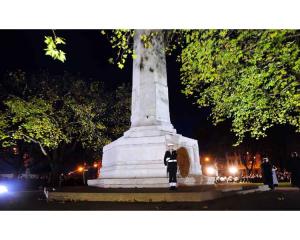"I've never been in the parades. I don't like being involved in all that," the 89-year-old World War 2 veteran says.
"I was very young back then. I've no bad memories. I just never really gave it any thought over the years. I feel sorry for the poor blokes who got killed. That was terrible. But it was just the sort of thing that happened."
Mr Pantell was just 17 when he left Hereford, England, to enlist in the British Eighth Army in January, 1939, and was soon seeing action.
"It was a wonderful thing, in a sense. You went to war with all the lads in your village. They were like your bosom friends. If someone went home on leave, he'd visit everyone's father and mother and tell them how you were."
But, far away from home, the reality of war was stark.
"It was bloody awful. I was a spotter in the artillery. I had a telephone and a map and I would work out how far the target was from the guns and give them the data to put into the guns. It was usually about five miles [8km] back."
His worst experience was the Battle of Monte Cassino, in Italy, from January to May, 1944.
"The Germans seemed to have a power over us. We believed German officers were in the [Monte Cassino] cathedral," he recalled.
"The closest I ever came [to being killed] was when I was coming down from the hill on to the flat and there was a huge German machine-gun thing in front of me and it fired at me, but I didn't get touched.
Fighting with New Zealand troops in the Italian Campaign influenced his life after the war.
"They were fine chaps and we always got on well together.
They'd tell us all about their country and I always wanted to come here. I thought New Zealand was a really lovely country," he said.
"When the time came to be demobbed you could choose any Commonwealth country that had fought in the war. It didn't cost me anything, The Government paid for it all."
He moved to Christchurch and studied agriculture at Lincoln University.
"There was a chap doing my course who was a Maori captain at Cassino. His legs were chopped up by [fire from] a machine-gun there. He had to walk on his knees to get back alive."
Mr Pantall and his wife, Zoe, who met on VE Day, on May 8, 1945, moved to Balclutha in 1964 and have lived there ever since.




